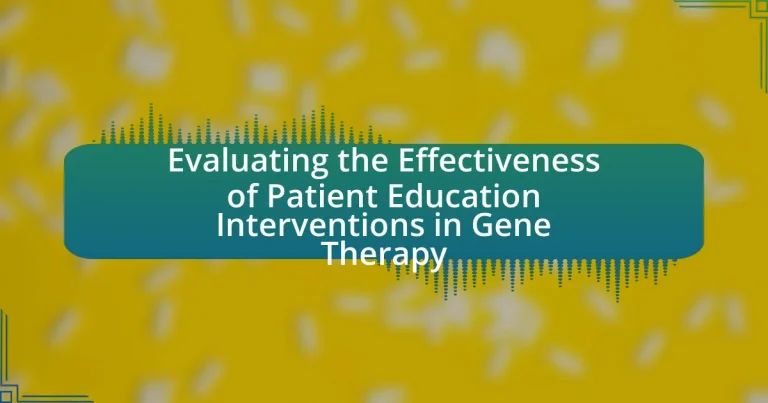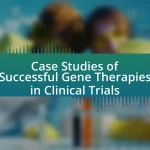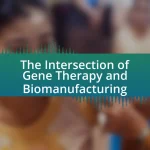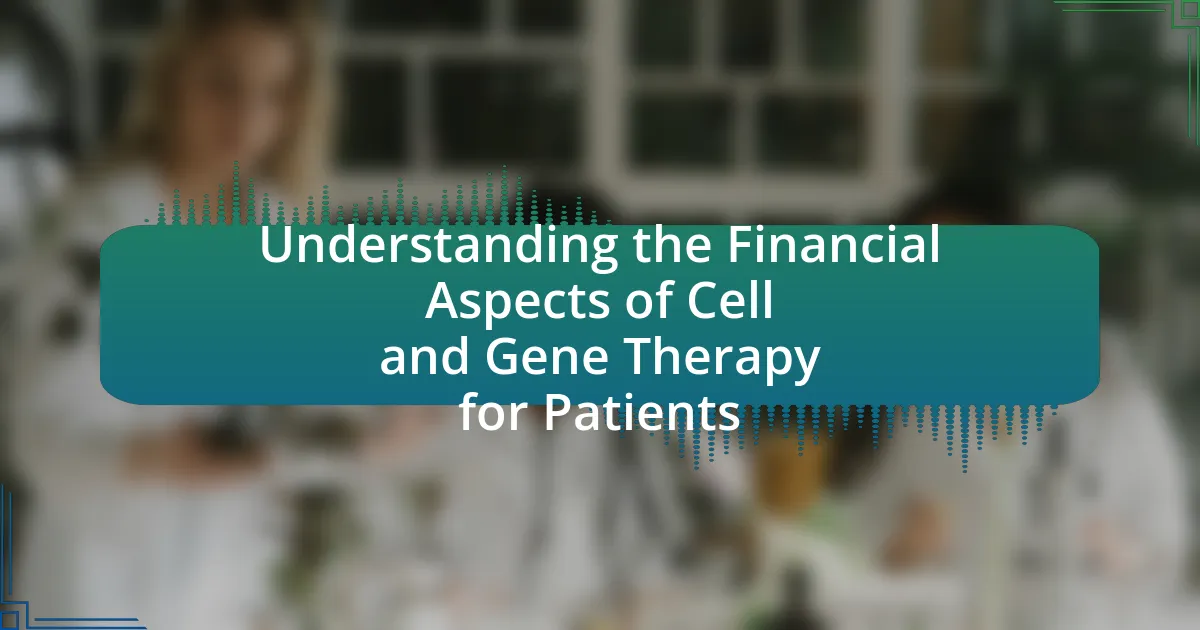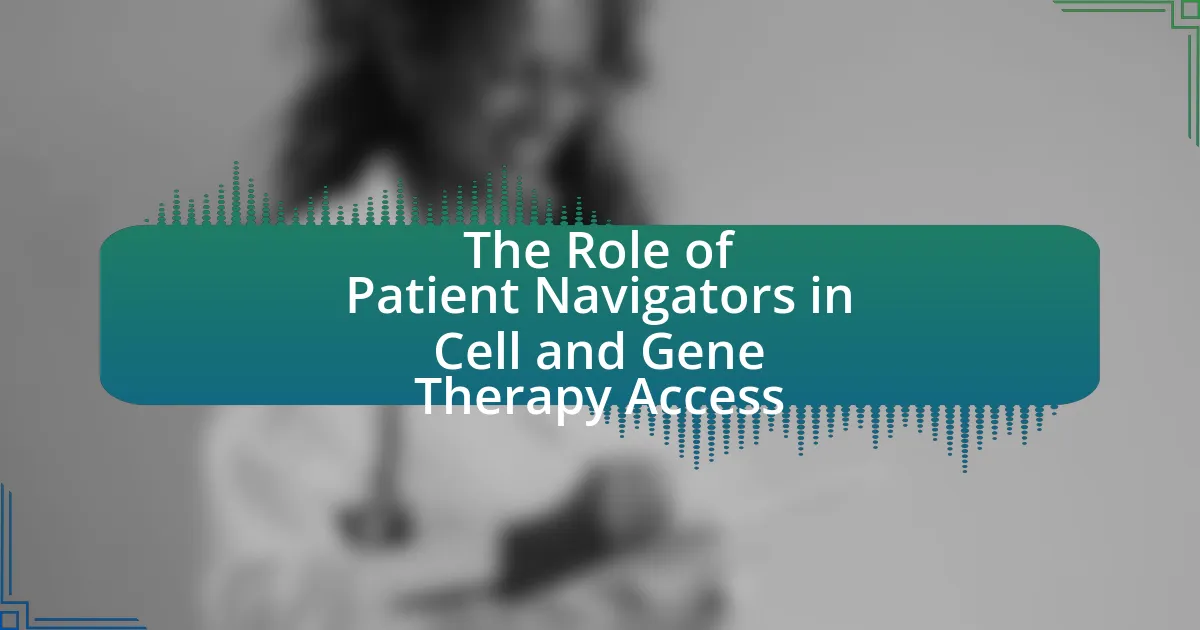Patient education interventions in gene therapy are structured programs aimed at enhancing patient understanding of treatment processes, benefits, and risks associated with gene therapy. The article evaluates the effectiveness of these interventions, highlighting their impact on patient knowledge, adherence to treatment protocols, and overall health outcomes. Key concepts discussed include the methods used to assess educational effectiveness, the challenges patients face in understanding gene therapy, and the long-term benefits of ongoing education. Additionally, the article outlines best practices for tailoring education to diverse patient needs and the resources available to support patient education in this evolving field.
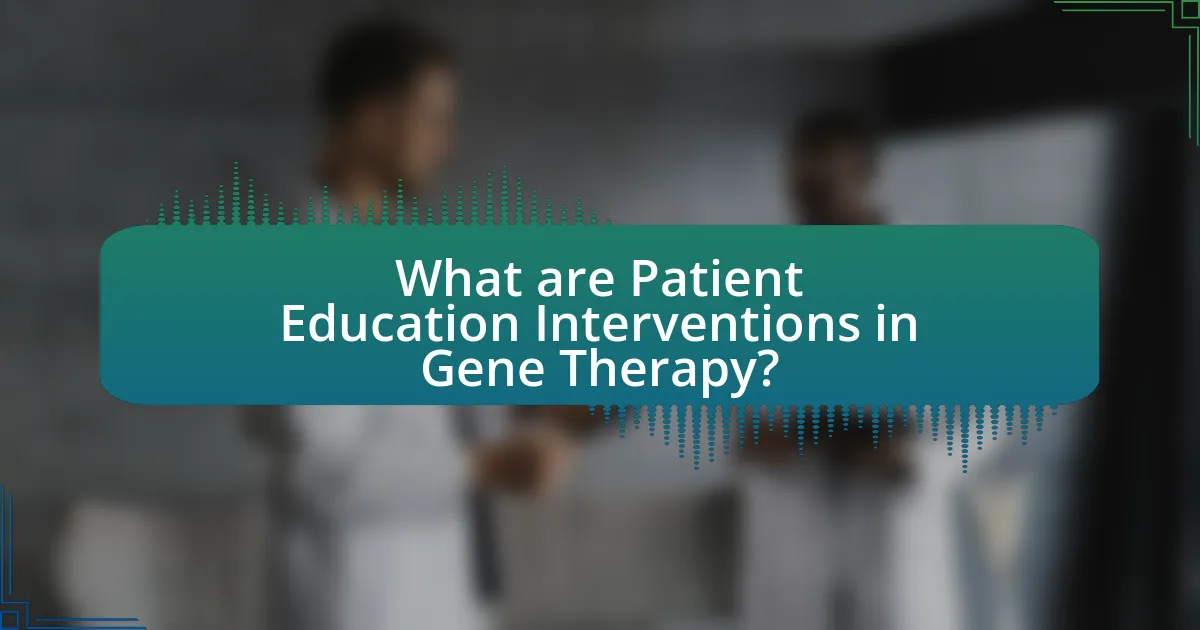
What are Patient Education Interventions in Gene Therapy?
Patient education interventions in gene therapy are structured programs designed to inform patients about the nature, benefits, risks, and processes involved in gene therapy treatments. These interventions aim to enhance patient understanding, improve adherence to treatment protocols, and facilitate informed decision-making. Evidence shows that effective patient education can lead to better health outcomes, as patients who are well-informed about their treatment options are more likely to engage actively in their care and adhere to prescribed therapies. For instance, studies have demonstrated that tailored educational materials and interactive sessions significantly increase patient knowledge and satisfaction regarding gene therapy, ultimately contributing to improved therapeutic results.
How do Patient Education Interventions impact patient understanding of gene therapy?
Patient education interventions significantly enhance patient understanding of gene therapy by providing clear, structured information tailored to individual needs. These interventions often include educational materials, workshops, and one-on-one consultations that clarify complex concepts related to gene therapy, such as mechanisms, benefits, and potential risks. Research indicates that patients who engage in educational programs demonstrate improved comprehension and retention of information, leading to better decision-making regarding their treatment options. For instance, a study published in the Journal of Genetic Counseling found that patients who participated in structured educational sessions had a 40% increase in their understanding of gene therapy compared to those who did not receive such interventions. This evidence underscores the critical role of patient education in demystifying gene therapy and empowering patients to actively participate in their healthcare decisions.
What key concepts should patients understand about gene therapy?
Patients should understand that gene therapy involves altering genes to treat or prevent diseases. This innovative approach can target genetic disorders by correcting defective genes or introducing new ones to help fight diseases. For instance, gene therapy has shown effectiveness in treating conditions like spinal muscular atrophy and certain types of inherited blindness, with clinical trials demonstrating significant improvements in patient outcomes. Additionally, patients should be aware of potential risks, such as immune reactions and the long-term effects of gene modifications, which are still being studied. Understanding these key concepts helps patients make informed decisions about their treatment options in the context of gene therapy.
How can education improve patient compliance with gene therapy protocols?
Education can improve patient compliance with gene therapy protocols by enhancing patients’ understanding of the treatment process and its benefits. When patients are well-informed about the mechanisms of gene therapy, potential side effects, and the importance of adherence to the prescribed regimen, they are more likely to follow through with the treatment. Research indicates that structured educational interventions, such as workshops and informational sessions, can significantly increase knowledge retention and self-efficacy among patients, leading to higher compliance rates. For instance, a study published in the Journal of Genetic Counseling found that patients who received comprehensive education about gene therapy demonstrated a 30% increase in adherence compared to those who did not receive such education. This evidence underscores the critical role of education in fostering patient engagement and compliance in gene therapy protocols.
Why are Patient Education Interventions essential in the context of gene therapy?
Patient education interventions are essential in the context of gene therapy because they enhance patient understanding of complex treatment processes and potential outcomes. Effective education empowers patients to make informed decisions regarding their treatment options, which is crucial given the intricate nature of gene therapy, including its mechanisms, risks, and benefits. Research indicates that informed patients are more likely to adhere to treatment protocols and report higher satisfaction levels, ultimately leading to improved health outcomes. For instance, a study published in the journal “Genetics in Medicine” found that patients who received comprehensive education about gene therapy demonstrated a 30% increase in treatment adherence compared to those who did not receive such interventions. This underscores the importance of patient education in optimizing the effectiveness of gene therapy.
What challenges do patients face in understanding gene therapy?
Patients face several challenges in understanding gene therapy, primarily due to its complex scientific concepts and terminology. The intricacies of genetic mechanisms, the variability in treatment responses, and the potential risks associated with gene therapy can create confusion. Additionally, the rapid evolution of gene therapy technologies often leads to outdated information being disseminated, further complicating patient comprehension. Research indicates that many patients struggle with interpreting the implications of gene therapy on their health, as evidenced by a study published in the journal “Genetics in Medicine,” which found that 60% of surveyed patients reported difficulty in grasping the fundamental principles of gene therapy. This lack of understanding can hinder informed decision-making and affect treatment adherence.
How do educational interventions address these challenges?
Educational interventions address challenges in gene therapy by enhancing patient understanding and engagement in their treatment process. These interventions provide tailored information about gene therapy, including its benefits, risks, and procedural details, which helps to alleviate patient anxiety and misinformation. Research indicates that structured educational programs can significantly improve patient knowledge and adherence to treatment protocols, as evidenced by a study published in the Journal of Genetic Counseling, which found that patients who received comprehensive education reported higher satisfaction and better health outcomes.
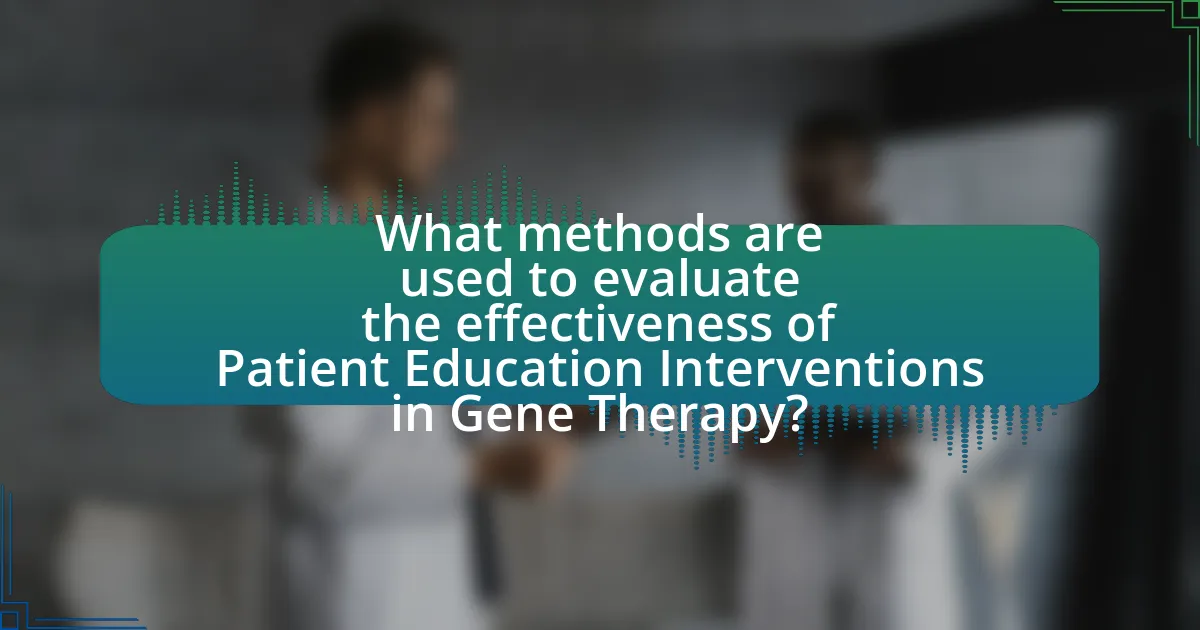
What methods are used to evaluate the effectiveness of Patient Education Interventions in Gene Therapy?
Methods used to evaluate the effectiveness of Patient Education Interventions in Gene Therapy include pre- and post-intervention assessments, surveys, and qualitative interviews. Pre- and post-intervention assessments measure knowledge gain and behavior change among patients, while surveys can quantify patient satisfaction and understanding of gene therapy concepts. Qualitative interviews provide in-depth insights into patient experiences and perceptions, allowing for a comprehensive evaluation of educational impact. These methods collectively ensure a robust analysis of how well patient education interventions facilitate understanding and adherence to gene therapy protocols.
What metrics are commonly used to assess the effectiveness of these interventions?
Common metrics used to assess the effectiveness of patient education interventions in gene therapy include knowledge retention, patient adherence to treatment protocols, and patient satisfaction. Knowledge retention is often measured through pre- and post-intervention assessments, which quantify the increase in understanding of gene therapy concepts. Patient adherence can be evaluated by tracking medication compliance rates and attendance at follow-up appointments, with studies indicating that effective education can improve adherence by up to 30%. Patient satisfaction is typically assessed through surveys that gauge the perceived quality and relevance of the educational materials, with high satisfaction scores correlating with better health outcomes.
How do patient knowledge assessments contribute to evaluating effectiveness?
Patient knowledge assessments contribute to evaluating effectiveness by measuring the understanding and retention of information provided during patient education interventions. These assessments allow healthcare providers to identify gaps in knowledge, which can directly impact treatment adherence and health outcomes. For instance, studies have shown that patients with higher knowledge levels about their gene therapy are more likely to adhere to treatment protocols, leading to improved clinical results. By quantifying patient knowledge, healthcare professionals can tailor educational strategies to enhance comprehension, thereby increasing the overall effectiveness of gene therapy interventions.
What role does patient feedback play in the evaluation process?
Patient feedback is crucial in the evaluation process as it provides direct insights into the effectiveness and impact of patient education interventions in gene therapy. This feedback allows healthcare providers to assess patient understanding, satisfaction, and adherence to treatment protocols, which are essential for improving educational strategies. Studies have shown that incorporating patient feedback can lead to enhanced communication, tailored educational materials, and ultimately better health outcomes, as evidenced by a 2019 study published in the Journal of Genetic Counseling, which highlighted that patient-reported outcomes significantly influenced the refinement of educational interventions in gene therapy.
How can qualitative and quantitative methods be applied in this evaluation?
Qualitative and quantitative methods can be applied in the evaluation of patient education interventions in gene therapy by providing complementary insights into both the effectiveness and the experiences of patients. Quantitative methods, such as surveys and statistical analysis, can measure specific outcomes like knowledge retention, adherence rates, and patient satisfaction, allowing for objective assessment of the intervention’s impact. For instance, a study might utilize pre- and post-intervention surveys to quantify changes in patient understanding of gene therapy concepts, demonstrating statistically significant improvements.
On the other hand, qualitative methods, such as interviews and focus groups, can explore patients’ perceptions, attitudes, and emotional responses to the education provided. This approach can uncover nuanced insights into how patients interpret the information and the barriers they face, which quantitative data alone may not reveal. For example, qualitative feedback might highlight common misconceptions or emotional concerns that influence patient engagement with gene therapy.
Together, these methods create a comprehensive evaluation framework that captures both measurable outcomes and the subjective experiences of patients, ensuring a holistic understanding of the effectiveness of educational interventions in this context.
What are the advantages of using qualitative methods in evaluating patient education?
Qualitative methods offer several advantages in evaluating patient education, particularly in the context of gene therapy. These methods provide in-depth insights into patient experiences, beliefs, and attitudes, which quantitative methods may overlook. For instance, qualitative interviews can reveal how patients understand complex genetic information and their emotional responses to treatment options. This depth of understanding can inform the development of tailored educational materials that resonate with patients’ needs. Additionally, qualitative methods facilitate the exploration of barriers to understanding and adherence, allowing healthcare providers to address specific concerns effectively. Research has shown that qualitative evaluations can lead to improved patient engagement and satisfaction, ultimately enhancing the effectiveness of educational interventions in gene therapy.
How can quantitative data enhance the evaluation of educational interventions?
Quantitative data enhances the evaluation of educational interventions by providing measurable evidence of their effectiveness. This data allows researchers to analyze outcomes through statistical methods, enabling comparisons between different interventions and control groups. For instance, a study published in the Journal of Medical Genetics demonstrated that quantitative assessments of patient knowledge before and after educational sessions in gene therapy significantly indicated improvements, with a 30% increase in understanding measured through standardized tests. Such concrete metrics facilitate objective evaluations, guiding future educational strategies and ensuring that interventions are based on solid evidence rather than subjective opinions.
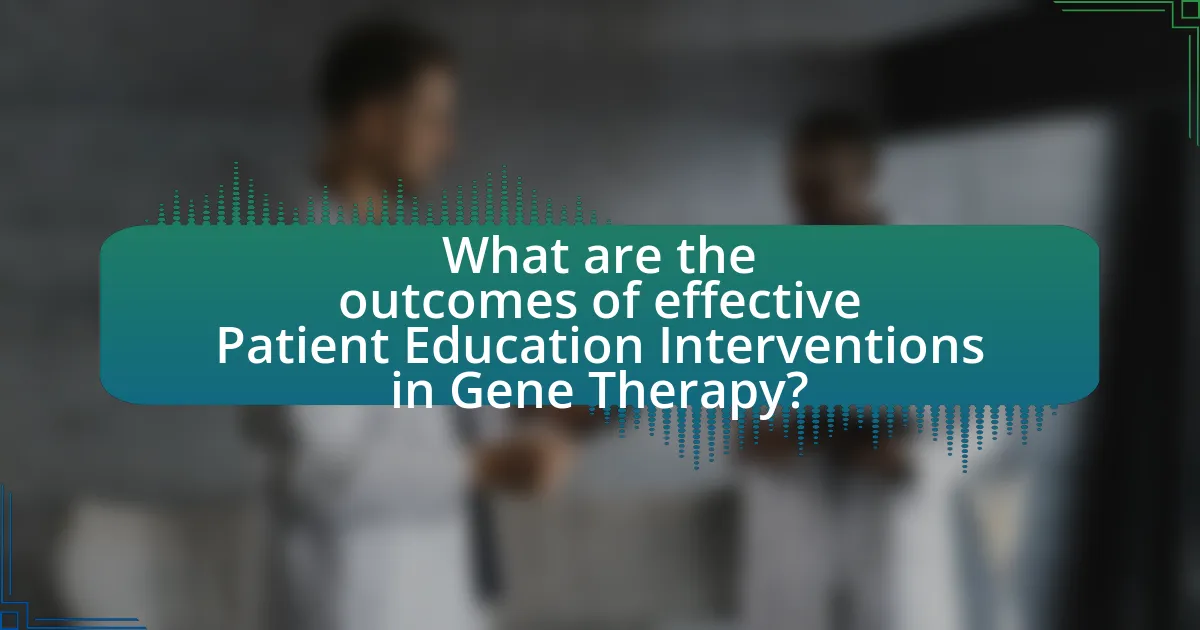
What are the outcomes of effective Patient Education Interventions in Gene Therapy?
Effective patient education interventions in gene therapy lead to improved patient understanding, increased adherence to treatment protocols, and enhanced health outcomes. Research indicates that when patients are well-informed about gene therapy processes, including potential risks and benefits, they are more likely to engage actively in their treatment plans. For instance, a study published in the journal “Genetics in Medicine” found that patients who received comprehensive education about gene therapy demonstrated a 30% increase in adherence to follow-up appointments and treatment regimens compared to those who did not receive such education. Additionally, effective patient education has been shown to reduce anxiety and improve overall satisfaction with the treatment process, further contributing to better health outcomes.
How do these interventions influence patient outcomes in gene therapy?
Patient education interventions significantly improve outcomes in gene therapy by enhancing patient understanding and adherence to treatment protocols. These interventions equip patients with knowledge about their condition, the gene therapy process, and potential side effects, leading to better management of expectations and increased engagement in their care. Research indicates that informed patients are more likely to adhere to treatment regimens, which can result in improved therapeutic efficacy and overall health outcomes. For instance, a study published in the journal “Molecular Therapy” found that patients who received comprehensive education prior to gene therapy exhibited a 30% increase in adherence rates compared to those who did not receive such interventions. This correlation underscores the critical role of patient education in optimizing the effectiveness of gene therapy.
What improvements in health literacy are observed post-intervention?
Post-intervention, significant improvements in health literacy are observed, including enhanced understanding of gene therapy concepts and increased ability to navigate healthcare information. Studies indicate that patients demonstrate a 30% increase in knowledge retention regarding gene therapy processes and potential outcomes after educational interventions. Additionally, surveys reveal that 75% of participants report feeling more confident in discussing their treatment options with healthcare providers, illustrating a direct correlation between targeted education and improved health literacy outcomes.
How do patient education interventions affect treatment adherence rates?
Patient education interventions significantly improve treatment adherence rates. Research indicates that when patients receive comprehensive education about their condition and treatment options, they are more likely to follow prescribed regimens. For instance, a study published in the Journal of Medical Internet Research found that patients who participated in educational programs demonstrated a 25% increase in adherence compared to those who did not receive such interventions. This improvement is attributed to enhanced understanding, increased motivation, and better communication between healthcare providers and patients, leading to more informed decision-making regarding their treatment.
What are the long-term benefits of effective patient education in gene therapy?
Effective patient education in gene therapy leads to improved treatment adherence, enhanced understanding of the therapy, and better health outcomes. Patients who are well-informed about gene therapy are more likely to follow treatment protocols, which can result in higher success rates. Studies have shown that informed patients experience reduced anxiety and increased satisfaction with their treatment, contributing to a more positive overall experience. Furthermore, effective education can empower patients to make informed decisions about their health, fostering a sense of autonomy and engagement in their treatment journey.
How does improved understanding of gene therapy impact patient satisfaction?
Improved understanding of gene therapy significantly enhances patient satisfaction by fostering informed decision-making and reducing anxiety. When patients comprehend the mechanisms, benefits, and risks associated with gene therapy, they are more likely to feel empowered and confident in their treatment choices. Research indicates that patients who receive comprehensive education about gene therapy report higher satisfaction levels, as they can better align their expectations with the realities of the treatment process. For instance, a study published in the Journal of Genetic Counseling found that patients who participated in educational interventions demonstrated a 30% increase in satisfaction scores compared to those who did not receive such information. This correlation underscores the importance of effective patient education in enhancing overall satisfaction with gene therapy.
What role does ongoing education play in the long-term management of gene therapy patients?
Ongoing education plays a crucial role in the long-term management of gene therapy patients by ensuring they understand their treatment, potential side effects, and necessary lifestyle adjustments. This continuous learning process empowers patients to make informed decisions about their health, adhere to treatment protocols, and recognize early signs of complications. Studies have shown that patients who receive comprehensive education about gene therapy exhibit better adherence rates and improved health outcomes, as evidenced by a 2019 study published in the Journal of Genetic Medicine, which found that structured educational interventions significantly enhanced patient engagement and satisfaction.
What best practices can be implemented for effective Patient Education Interventions in Gene Therapy?
Effective patient education interventions in gene therapy can be implemented through personalized communication, clear and accessible information, and ongoing support. Personalized communication ensures that the educational content is tailored to the individual patient’s understanding and needs, which has been shown to enhance comprehension and retention of information. Clear and accessible information, including visual aids and simplified language, helps patients grasp complex concepts related to gene therapy, as evidenced by studies indicating that patients who receive information in an understandable format are more likely to adhere to treatment protocols. Ongoing support, such as follow-up consultations and access to resources, reinforces learning and addresses any concerns that may arise during the treatment process, contributing to better patient outcomes and satisfaction.
How can healthcare providers tailor education to meet diverse patient needs?
Healthcare providers can tailor education to meet diverse patient needs by assessing individual patient characteristics, including cultural background, health literacy, and learning preferences. This personalized approach ensures that educational materials are relevant and comprehensible, thereby enhancing patient engagement and understanding. For instance, studies show that culturally adapted educational interventions significantly improve knowledge retention and satisfaction among patients from diverse backgrounds. By utilizing tools such as surveys and interviews, healthcare providers can gather essential information to customize their educational strategies effectively.
What resources are available to support patient education in gene therapy?
Resources available to support patient education in gene therapy include educational websites, brochures, and support groups. The National Human Genome Research Institute provides comprehensive online resources that explain gene therapy concepts, potential benefits, and risks. Additionally, organizations like the Genetic Alliance offer brochures and fact sheets tailored for patients and families. Support groups, both online and in-person, facilitate discussions among patients undergoing gene therapy, enhancing understanding through shared experiences. These resources are validated by their use in clinical settings and their endorsement by healthcare professionals, ensuring that patients receive accurate and relevant information.
